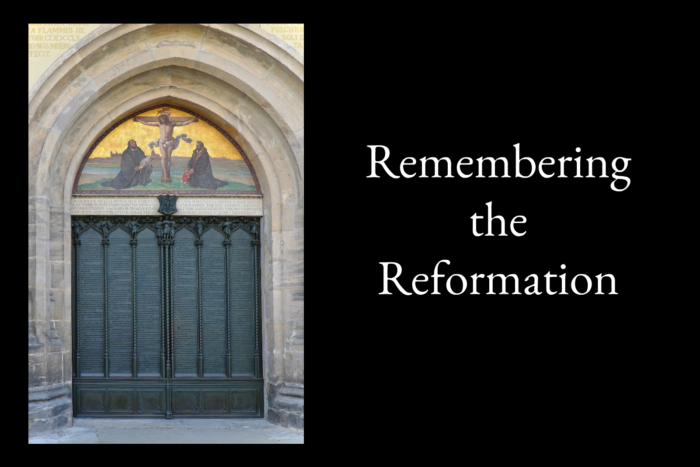
As I have been filling my head with information about the Reformation through websites, podcasts, YouTube videos, and books, I have realized something: It is like a bottomless well of information and I am just touching the surface. I feel completely inadequate to even present a timeline. The more I know about the Reformation, the more I realize how much I don’t know. But I am going to go ahead and present a basic timeline of the most important events with just a bit of information about them. (If you think I missed something important please don’t hesitate to let me know so that I can add it). I hope this is a helpful resource as we continue our study on the Reformation.
One thing that is of important note before I give the timeline is just how much the Reformation changed Western culture. As one speaker put it: The Reformation is the foundation of Western Civilization. This period of time re-established the authority of scripture, the priesthood of the believer, and the importance of a personal relationship with God—all things taught in the New Testament but lost among the common man in the false religion of Catholicism. It also brought about the birth of free enterprise and highlighted the importance of education and literacy. And, let’s not forget–it changed how the culture viewed marriage and family.
It is safe to say that it would be a very, very different world, if not for the Reformation.
We tend to think of this time as religious only, but what I have realized is that God’s ways are perfect–not just for our spiritual health, but in all ways. The Bible teaches us tools for all of life and we can see this truth when we look at the Reformation.
Here is the timeline–
1440— Somewhere around 1440, Johannes Gutenberg invents the printing press. I include this as the first item on this timeline because without a printing press there would not have been a Reformation. It was this machine that enabled Luther’s 95 Theses and other writings to be spread across the land.
1517–Luther nails the 95 Theses on to the church door at Wittenberg
Luther becomes distressed at how the pope, Leo X, has decided to use indulgences to raise funds for his dwindling coffers. A guy by the name of Tetzel is Leo’s representative in the region where Luther lives. Tetzel comes up with a little jingle (that rhymes in German as well as in English!): Every time the coffer rings another soul from purgatory springs. With his coffer and jingle, Tetzel travels the countryside, convincing people that their dead loved ones will remain in purgatory unless they pay to get them out. It is specifically in response to this unbiblical practice that Luther writes his 95 theses. He takes them and nails them to the door of the Wittenberg church. He actually receives little notice from the academic world (his intended audience), but a few students find them, copy them into common vernacular, and disseminate them all through Germany.
1519– Leipzig Debate
Luther is invited to debate Johann Eck at the Pleissenburg Castle in Leipzig, Germany. Here they discuss many different topics of the Catholic religion. There is one thing that Luther says during this debate that fans the small flame he had started two years before with his 95 theses and it is this: Scripture is the sole authority in the life of a Christian and that Christ is the true head of the Church. This statement is considered heresy, since the Pope is viewed as the sole authority for all people and also as the head of the church (and, by the way, he is still viewed that way in Catholicism today). These statements by Luther start the fires of the Reformation to start sweeping across the land.
1519– Ulrich Zwingli starts preaching expositionally through the New Testament
While Luther was causing people to re-think religion in Germany, Zwingli–completely independent of Luther–was doing the same thing in Switzerland. His sermons through the New Testament would serve as the catalyst for the changes he would bring to religion there. In a few years he would write his sixty-seven theses against many of the man-created Catholic church practices.
1520– Luther publishes the Christian Nobility of the German Nation
It is in this publication that he teaches the priesthood of the believer.
1521– Diet of Worms
In 1520, Pope Leo had issued a papal bull calling Luther a heretic and so the Holy Roman Emperor at the time, Charles V, calls for the Diet of Worms which will serve as an inquisition into the accusations against Luther. Here Luther reaffirms his commitment to scripture and confirms that he will not recant. He is quoted as saying– “Unless I am convinced by the testimony of the Scriptures or by clear reason (for I do not trust either in the pope or in councils alone, since it is well known that they have often erred and contradicted themselves), I am bound by the Scriptures I have quoted and my conscience is captive to the Word of God. I cannot and will not recant anything, since it is neither safe nor right to go against conscience. May God help me. Amen.”
1522– Luther publishes the German Bible
Luther is captured on his way home from the Diet of Worms by Frederick the Wise, in an effort to protect his life after his refusal to recant. During his ten month captivity in Wartburg Castle, he translates the New Testament from Ancient Greek into German in just ten weeks.
1525– Luther marries Katherine Von Bora
Katherine is a former nun and wastes no time making a godly home for Luther. Together they completely change how the culture views marriage and family, particularly for the clergy. Before their marriage, women and marriage were viewed rather negatively. Luther proclaims that marriage is a God-given blessing and then lives this by his example. We cannot underestimate the importance of the Luthers’ godly marriage and loving family. I know it sounds redundant but it is worth repeating: The Luthers were critically instrumental in changing how Western culture views marriage and family.
1526– William Tyndale published the first English Bible
Tyndale, driven by a like-minded conviction as Luther to make the scriptures available to the common man, was the first to translate the scriptures into the English language. This was condemned not only by the Catholic Church but also by the King of England, Henry VIII.
1531– Zwingli is killed in battle
Preaching the Gospel in Switzerland is prohibited and a few are even being martyred as heretics for their stands against the Catholic church. This eventually leads to the Battle of Kappel and Zwingli falls while defending Zurich against Catholic forces.
1534– Ignatius of Loyala founds the Society of Jesus (Jesuits)
This Roman Catholic missionary organization was part of an effort to create a Catholic counter-reformation and parts of Poland, Hungary, and Germany are recovered from Protestantism back to Catholicism. This society is still at work today and there is much that could be written, but you will have to research the Jesuits on your own (a very interesting and fascinating study, to say the least!)
1534– Henry VIII declares himself Head of the Church of England
Disgruntled at the Pope’s unwillingness to grant his divorce from Catharine of Aragon, Henry breaks from the Catholic church and creates the similar “Church of England”. The Act of Royal Supremacy restores the power of the church back to the King of England where, according to this document, it had been before it was supposedly usurped by the Roman Catholic Church.
1536– Tyndale is martyred
Tried and convicted on a charge of heresy, he is burned at the stake. His last words were “Lord! Open the king of England’s eyes!”
1536– John Calvin publishes the Institutes of Christian Religion
This systematic theology encompasses all of Protestant beliefs into one work. Calvin–so sadly known often only for his stand on pre-destination–wrote many other wonderful and edifying books about the Christian faith. He was a truly gifted man who was used by God to change the world. (I will write more about him later.)
1545-1563– Council of Trent
This council meets to reform and clarify Catholic doctrine. Incidentally, the modern day Catholic church has never rescinded the extra-biblical and unbiblical doctrines and beliefs confirmed during the Council of Trent and therefore must be viewed as a false religion.
1560– Geneva Bible is published
This is the first English edition to use chapter and verse divisions.
1611– The King James Bible is published
King James of England orders this new translation to try to unify the various religious factions of his kingdom and to replace the controversial Geneva Bible, which had included revolutionary notations (not part of the original manuscripts) in the margins. In fact, he specified that there were to be no notes in the margins of this new translation!
1618-1619– The Synod of Dort
The Dutch Reformed Church holds this Synod to discuss the issues raised by the supports of Jacobus Arminius. At the synod, five-point Calvinism is upheld in opposition to Arminianism. (It is worth noting that it is at this time that John Calvin’s name becomes so associated with this doctrine. This leads many who could grow spiritually from his many worthwhile books to avoid them. It is quite unfortunate.)
Wow! That is a lot to take in. If you are still reading, I am impressed! Of course, Church History doesn’t end in 1619 and there are so many events and people worthy of blog posts. I didn’t even touch on the Puritans, who were so incredibly instrumental in upholding literal interpretation of scripture and were most surely reformers in their own right. I also didn’t get into anything regarding the Anabaptists, led by Menno Simons and also worthy of note during this time. As I have time to learn more I may come back and add more to this timeline. But, for now, I do hope that this will be a helpful resource to you and that you have learned something new today.
I will be taking a break for a few weeks from this series as I will not have time over the next few weeks to do the research necessary. But when I return, I will be covering some individuals and the part they had to play in the Reformation. In these posts, I will give more detail than I was able to give here. Hope you will stick around as I continue the series!
If you’d like to know more, these are most of the resources I used. I especially recommend the lecture by Nathan Busenitz (the first link) and the video by Ryan Reeves (the second link)–
https://www.gracechurch.org/sermons/13326
https://www.youtube.com/watch?v=Pn0QlENHlrQ&t=61s
https://www.tms.edu/preachersandpreaching/the-fire-that-fueled-the-reformation/
https://www.youtube.com/watch?v=4qrSgNbeG5E&t=1228s
https://www.youtube.com/watch?v=Faf6ISLbPQ8
http://www.ligonier.org/store/luther-and-the-reformation-download/
https://www.thelocal.de/20150717/this-week-in-history-martin-luther-and-the-leipzig-debate
http://www.ligonier.org/blog/zurich-revolutionary-ulrich-zwingli/
https://en.wikipedia.org/wiki/Wartburg
http://discerninghistory.com/2015/08/ulrich-zwinglis-death-at-kappel/
https://www.gotquestions.org/Tyndale-Bible.html
http://protestantism.co.uk/timeline.html
http://www.history.com/this-day-in-history/jesuit-order-established
http://www.britannia.com/history/articles/relpolh8.html
http://www.christianity.com/church/church-history/timeline/1601-1700/story-behind-king-james-bible-11630052.html
https://www.gotquestions.org/Diet-of-Worms.html






